
The Nair Service Society (NSS) is an organisation created for the social advancement and welfare of the Nair community that is found primarily in the state of Kerala in Southern part of India. It was established under the leadership of Mannathu Padmanabha Pillai. The NSS is a three-tier organisation with Karayogams at the base level, Taluk Unions at the intermediate level and a central headquarters operating from Perunna, Changanassery in Kerala. G. Sukumaran Nair is currently the General Secretary.

Nandita Das is an Indian actress and director. She has acted in over 40 feature films in ten different languages. Das appeared in the films Fire (1996), Earth (1998), Bawandar (2000), Kannathil Muthamittal (2002), Azhagi (2002),Kamli (2006), and Before The Rains (2007). Her directorial debut Firaaq (2008), premiered at the Toronto Film Festival and travelled to more than 50 festivals, winning more than 20 awards. Her second film as a director was Manto (2018). Based on the life of 20th Century Indo-Pakistani short story writer Sadat Hasan Manto, the film was screened at Cannes Film Festival in the "Un Certain Regard" section. In September 2019, Das produced a two-minute Public Service Announcement music video India's Got Colour. The music video is about the issue of colourism and urges the audience to celebrate India's diversity of skin colour. Her first book, 'Manto & I', chronicles her 6-year long journey of making the film. She wrote, directed, produced and acted in a short film called, Listen to Her, that sheds light on the increase in domestic violence and overburden of work that women have been facing during the lockdown. She had also sought petition seeking the commutation of the death sentence handed out to Ajmal Kasab.
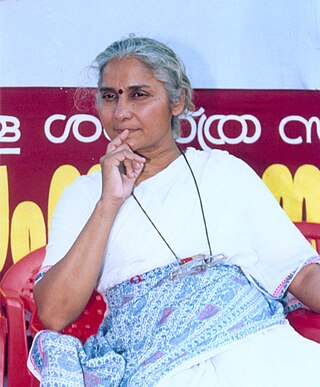
Medha Patkar is an Indian Social activist working on social issues for tribals, dalits, farmers, labourers and women facing injustice in India. She is an alumna of TISS, a premier institute of social science research in India.

Tata Institute of Social Sciences (TISS) is a multi-campus public university in Mumbai, India. It is Asia's oldest institute for professional social work education and was founded in 1936 in the then Bombay Presidency of British India as the Sir Dorabji Tata Graduate School of Social Work by the Sir Dorabji Tata Trust. In 1944, the institute was officially renamed the Tata Institute of Social Sciences and in 1964, the Government of India declared TISS a deemed university under Section 3 of the University Grants Commission Act (UGC), 1956.

Sunitha Krishnan is an Indian social activist and chief functionary and co-founder of Prajwala, a non-governmental organization that rescues, rehabilitates and reintegrates sex-trafficked victims into society. She was awarded India's fourth highest civilian award the Padma Shri in 2016.

India has a very high volume of child trafficking. As many as one child disappears every eight minutes, according to the National Crime Records Bureau. In some cases, children are taken from their homes to be bought and sold in the market. In other cases, children are tricked into the hands of traffickers by being presented an opportunity for a job, when in reality, upon arrival they become enslaved. In India, there are many children trafficked for various reasons such as labor, begging, and sexual exploitation. Because of the nature of this crime, it is hard to track; due to the poor enforcement of laws, it is difficult to prevent. As such, there are only vague estimates of figures regarding the issue. India is a prime area for child trafficking to occur, as many of those trafficked are from, travel through or destined to go to India. Though most of the trafficking occurs within the country, there is also a significant number of children trafficked from Nepal and Bangladesh. There are many different causes that lead to child trafficking, with the primary reasons being poverty, weak law enforcement, and a lack of good quality public education. The traffickers that take advantage of children can be from another area in India, or could even know the child personally. Children who return home after being trafficked often face shame in their communities, rather than being welcomed home.
Renana Jhabvala is an Indian social worker based in Ahmedabad, India, who has been active for decades in organising women into organisations and trade unions in India, and has been extensively involved in policy issues relating to poor women and the informal economy. She is best known for her long association with the Self-Employed Women's Association (SEWA), India, and for her writings on issues of women in the informal economy.
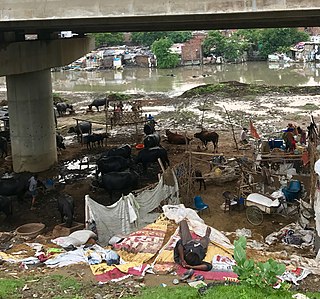
Homelessness is a major issue in India. The Universal Declaration of Human Rights defines 'homeless' as those who do not live in a regular residence. The United Nations Economic and Social Council Statement has a broader definition for homelessness; it defines homelessness as follows: ‘When we are talking about housing, we are not just talking about four walls and a roof. The right to adequate housing is about security of tenure, affordability, access to services and cultural adequacy. It is about protection from forced eviction and displacement, fighting homelessness, poverty and exclusion. India defines 'homeless' as those who do not live in Census houses, but rather stay on pavements, roadsides, railway platforms, staircases, temples, streets, in pipes, or other open spaces. There are 1.77 million homeless people in India, or 0.15% of the country's total population, according to the 2011 census consisting of single men, women, mothers, the elderly, and the disabled. However, it is argued that the numbers are far greater than accounted by the point in time method. For example, while the Census of 2011 counted 46,724 homeless individuals in Delhi, the Indo-Global Social Service Society counted them to be 88,410, and another organization called the Delhi Development Authority counted them to be 150,000. Furthermore, there is a high proportion of mentally ill and street children in the homeless population. There are 18 million street children in India, the largest number of any country in the world, with 11 million being urban. Finally, more than three million men and women are homeless in India's capital city of New Delhi; the same population in Canada would make up approximately 30 electoral districts. A family of four members has an average of five homeless generations in India.
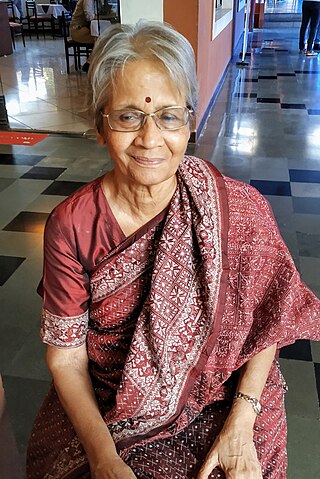
Shanta Gokhale is an Indian writer, translator, journalist and theatre critic. She is best known for her works Rita Welinkar and Tya Varshi.

Mithu Alur is the founder chairperson of The Spastic Society of India – now rechristened ADAPT – Able Disable All People Together. She is an educator, disability rights activist, researcher, writer and published author on issues concerning people with disability in India.
Butterflies is a registered voluntary organization that has been operating in Delhi since 1989. The organization focuses on assisting vulnerable children, particularly those on the streets. By employing a rights-based and participatory methodology, Butterflies aims to provide education and life skills to these children.
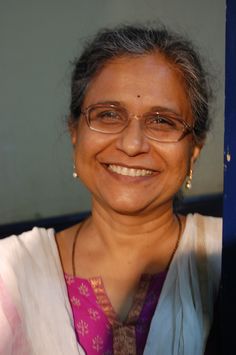
Priti Patkar is an esteemed social worker and human rights activist from India. She holds the position of co-founder and director at Prerana, an organization that has been a trailblazer in addressing issues within the red-light districts of Mumbai, India. Priti Patkar's efforts primarily focus on safeguarding children who are at risk of falling victim to commercial sexual exploitation and trafficking.

Safeena Husain is a social worker and founder of Educate Girls – a non-profit organisation that is headquartered in Mumbai, India. It focusses on mobilising communities for girls’ education in India’s rural and educationally backward areas. Under her leadership, Educate Girls’ launched world’s first Development Impact Bond in education which on its completion in 2018 surpassed both its target outcomes.
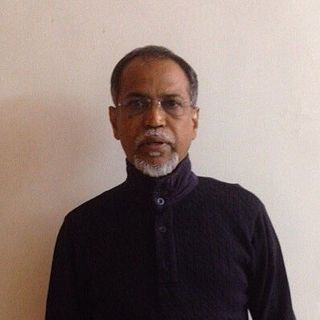
Pravin Patkar is an Indian academic and human rights activist. He co-founded Prerana, an NGO working for child protection & anti-human trafficking. In 1999, he founded Asia's first Anti-Human Trafficking Resource Centre supported by the US Government. He has served as an expert on several national and international agencies working in the anti-human trafficking sector. He has been in the teaching profession for over 40 years in both formal and non-formal education sectors. He has written books, published articles and created PSAs to prevent organized violence against women & children.
Madhav Sadashiv Gore (1921–2010) was an Indian social scientist, writer, academic and the chancellor of Jawaharlal Nehru University, Delhi. He was the Director of Tata Institute of Social Sciences (TISS), the vice-chancellor of the University of Mumbai and a recipient of the Life Time Achievement Award of Indian Sociological Society.
Mumtaz Shaikh is a women's rights activist from India who launched a successful campaign for equal access to public toilets in Mumbai. She was selected by the BBC in 2015 as one of its inspirational 100 Women campaign.
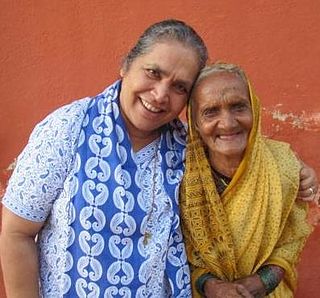
Lucy Kurien is the founder and director of Maher, a community and interfaith organization for abused and destitute women and children, headquartered in Pune, India.

Tage Rita is an agricultural engineer from Ziro Valley and is India's first kiwi wine brewer. In 2018, she was honored with the Women Transforming India Awards, organized by the United Nations and NITI Aayog.

India is the most populated country in the world with nearly a fifth of the world's population. According to the 2022 revision of the World Population Prospects the population stood at 1,407,563,842.
Meena is a pan-South Asian children's animated television series created by UNICEF. It has been broadcast in English, Bengali, Hindi, Nepali, Urdu, Odia and Dari languages and first aired on television in 1993 on Bangladesh Television. It has since been broadcast on state television in seven SAARC countries, including DD National in India. Ram Mohan, a famous Indian cartoonist, is the creator of the titular character Meena while UNICEF's Neill McKee was the series creator.















